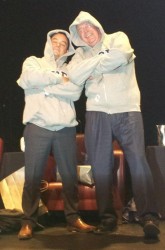Article Origin
Volume
Issue
Year
National Chief Shawn Atleo and former prime minister Paul Martin shared the stage at the University of Toronto’s Hart House Theatre on April 18 for a lecture hosted by the Ontario Institute for Studies in Education (OISE).
Dean of OISE, Julia O’Sullivan moderated the discussion and said in her opening remarks that “First Nations education is the most important and pressing educational priority in Canada for both Aboriginal and non-Aboriginal Canadians.”
As Canada’s largest and most influential faculty of Education, OISE has a “special responsibility to lead in this area,” said O’Sullivan. The theatre was filled to capacity with 450 people and hundreds more around the world following the webcast.
Martin blasted the federal government when he compared funding for on-reserve and off-reserve schools. Kids at schools off-reserve are getting funding anywhere from 20 to 40 per cent per capita more than the kids at on-reserve schools, Martin said.
“Can that be anything else but the most unspeakable kind of discrimination against the youngest and most vulnerable members of our society?” said Martin, the anger evident in his voice. The government says they want to build a strong economy, he said, “but how can you possibly build a strong economy when you underfund the education of the youngest, the fastest growing segment of our population. What kind of country are you building?”
Our children are waiting for the adults to sort this out for them, said Atleo. Access to equitable funding for education needs to be coupled with access to basic needs, like clean drinking water and proper housing, he said.
Atleo reflected on the era of the residential schools and government policy that sought to “kill the Indian in the child.” His own grandmother, he said, went through the residential school system, a system “which under the guise of education sought not to support and empower, but to take away and divide.” First Nations communities are working hard to repair the damage caused by the schools, he said.
“Education should be a tool of liberty, not a tool of oppression,” said Atleo.
Martin applauded the efforts of “the phenomenally courageous [Aboriginal] people out there…fighting odds the likes of which most of us can never even contemplate, and they’re succeeding. What Canada’s First Peoples, what the Inuit and the Metis have done in the course of the last decade with very little help, to be quite honest, is simply extraordinary and something of which we should be proud.” Martin was critical of the lack of media attention to the successes of Aboriginal people.
Atleo said the vision for education has not changed since the 1970s when the rallying cry was for “Indian control of Indian education.” It’s been updated, he said, to “First Nations control of First Nations education” so that First Nations leadership can design education that works for the people in their respective territories. Our people are very diverse, Atleo said. “Over 50 languages, we’re in every corner of the country, 633 First Nations and very different experiences in different parts of the country.” He emphasized that what might work for one area will not necessarily work for another.
Martin said a lot of Canadians will ask, “How could you possibly know how to control your own education?” In his travels across the country, he said, he’s met with many impressive First Nations, Métis and Inuit educators, experts in every facet of education who understand what has to be done. He contrasted this with the federal government who has no responsibility for education and thus, they have no education experts. Bureaucrats who have “absolutely no education background or education skills” are asking the likes of Shawn Atleo to report to them. “This is crazy. It is paternalistic,” said Martin, “but it is also just counterproductive.”
Martin has also become convinced that it is imperative to bring in cultural traditions and values into any educational program designed for Aboriginal people. “What [First Nations people] are saying is, if you want to be confident in your own identity, if you want to be confident in who you are, then you should be taught in the things that are familiar to you. When you teach business in a Canadian course, you don’t teach the American experience. Why shouldn’t it be true for them?...It’s about time that we began to understand that kind of thing.”
First Nations education cannot be discussed in isolation from all the other challenges facing First Nations people, said Atleo. He talked about the high suicide rates, poverty, the need to participate in the economy, the ongoing struggle for recognition of Aboriginal and treaty rights as enshrined in the Constitution.
“We have a bigger conversation that has to take place,” he said, “and one that is long outstanding.” He spoke about the large energy resource projects being proposed that may not go ahead, “because Indigenous people are standing up, they’re stepping forward, they’re speaking out and [saying] we need to give our free, prior and informed consent,” before those projects can proceed. It has to be a process of sitting down nation-to-nation, treaty by treaty and reconciling with one another between our jurisdictions.
Atleo asked Canadians to recognize this deeper challenge where four per cent of the population is reaching out to ask for help “to transform the lives of our children.”
Photo caption: National Chief Shawn Atleo and former Prime Minister Paul Martin model the hoodies presented to them by the Ontario Institute for Studies in Education at a First Nations Education lecture April 18.
- 4079 views

